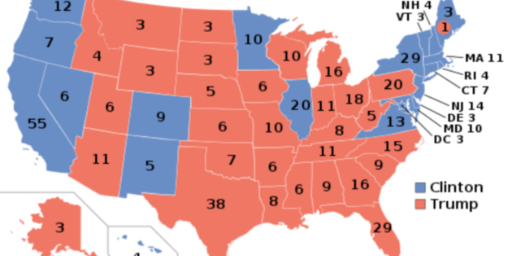A Quote to Ponder
Doing a little research and came across this:
“The conception of political equality from the Declaration of Independence, to Lincoln’s Gettysburg Address, to the Fifteenth, Seventeenth, and Nineteenth Amendments can mean only one thing-one person, one vote”–Justice William O. Douglas, writing for the majority in Gray v. Sanders (1963).
This was, interestingly enough, in the context of a system in the state of Georgia that allocated more electoral power to rural counties at the expense of urban counties–i.e., a situation in which certain voters had more electoral power than others. I am not noting this because it is legally significant to the ongoing debate electoral college, but it is certainly philosophically relevant.
Also, for trivia reasons, this is the case wherein “one person, one vote” originates, and not Baker v. Carr (1962).






We’ll get rid of the Electoral College right after a Republican loses the EC despite winning the popular vote, and not before.
@gVOR08:
So cynical, so dead on right.
does that “person” need to be a citizen? also, seeing as the maturity of the avg American is seemingly being postponed by the fed gov’t.(drinking laws at 21, staying on parents health ins until 26) what age should a “person” attain before being afforded the right/responsibility to vote?! don’t fall all over yourselves…..
@gVOR08: i assume this is a slight towards trump for understanding and using the ec to his advantage….
if he needed more votes from other states he would have campaigned there and got them.
sore losers are still losers.
@gVOR08:
No, that’s when the Democrats will switch from “archaic anti-Democratic institution” to “sacred protector of our Republic”.
@bill:
This is all pretty simple:
1) Only citizens can vote
2) The US Constitution sets the voting age at 18.
But, of course, neither of those issues has anything directly to do with “one person, one vote.”
@bill:
No. It’s a slam on Republicans for being unprincipled and ruthless. And a slam on Democrats for not standing up and matching them.
@gVOR08:
Don’t waste your breath. Bill doesn’t understand motives that aren’t petty. It’s that whole “banality of evil” thing; he’s quite representative that way.
@bill: “if he needed more votes from other states he would have campaigned there and got them.”
Oh, yes. The only reason Trump didn’t win California and New York was because he didn’t campaign there.
My contempt for you is so total I almost believe you believe this.
@Steven L. Taylor:
They have as much to do with “one person, one vote” as the Electoral College does.
Mike
@MBunge: Actually, those two themes have a lot in common in terms of philosophical discussion about representation. Indeed, the reason we had cases like the one cited here, as well as Baker v. Carr is because of disjunctures between rural and urban voters and the fact that those who benefited under malapportionment sought to maintain such systems.
You may not like it, but the issues are very much linked.